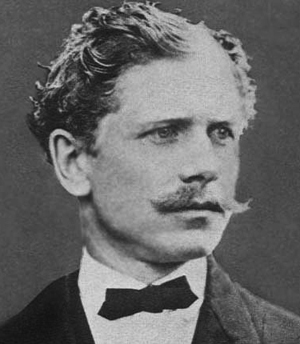
Ambrose Gwinnett Bierce (June 24, 1842 – circa 1914) was an American editorialist, journalist, short story writer, fabulist, and satirist. He wrote the short story "An Occurrence at Owl Creek Bridge" and compiled a satirical lexicon, The Devil's Dictionary. His vehemence as a critic, his motto "Nothing matters", and the sardonic view of human nature that informed his work, all earned him the nickname "Bitter Bierce".
In 1913, Bierce traveled to Mexico to gain first-hand experience of the Mexican Revolution. While traveling with rebel troops, he disappeared without a trace. (Click here for full Wikipedia article)
-----
A funeral is a pageant whereby we attest our respect for the dead by enriching the undertaker.
A man is the sum of his ancestors; to reform him you must begin with a dead ape and work downward through a million graves.
Abstainer, n. A weak person who yields to the temptation of denying himself a pleasure. A total abstainer is one who abstains from everything but abstention, and especially from inactivity in the affairs of others.
Absurdity, n. A statement or belief manifestly inconsistent with one's own opinion.
Academe, n. An ancient school where morality and philosophy were taught.
Academy, n. (from academe). A modern school where football is taught.
Accord, n. Harmony.
Accordion, n. An instrument in harmony with the
sentiments of an assassin.
Achievement-The death of endeavor and the birth of disgust.
Admiration, n. Our polite recognition of another's resemblance to ourselves.
All are lunatics, but he who can analyze his delusion is called a philosopher.
Alone, adj. In bad company.
An army's bravest men are its cowards. The death which they would not meet at the hands of the enemy they will meet at the hands of their officers, with never a flinching.
Birth, n. The first and direst of all disasters.
Bore, n. A person who talks when you wish him to listen.
Bride, n. A woman with a fine prospect of happiness behind her.
Calamities are of two kinds: misfortunes to ourselves, and good fortune to others.
Capital, n. The seat of misgovernment.
Christian, n. One who believes that the New Testament is a divinely inspired book admirably suited to the spiritual needs of his neighbor. One who follows the teachings of Christ so long as they are not inconsistent with a life of sin.
Conservative, n. A statesman enamored of existing evils, as opposed to a Liberal, who wants to replace them with others.
Consult, v. To seek another's approval of a course already decided on.
Corporation, n. An ingenious device for obtaining individual profit without individual responsibility.
Cynic, n. A blackguard whose faulty vision sees things as they are, not as they ought to be. Hence the custom among the Scythians of plucking out a cynic's eyes to improve his vision.
Day, n. A period of twenty-four hours, mostly misspent.
Deliberation, n. The act of examining one's bread to determine on which side it is buttered.
Diplomacy, n. The patriotic art of lying for one's country.
Education, n. That which discloses to the wise and disguises from the foolish their lack of understanding.
Egotist, n. A person of low taste, more interested in himself than in me.
Erudition, n. Dust shaken out of a book into an empty skull.
Faith, n. Belief without evidence in what is told by one who speaks without knowledge, of things without parallel.
Fidelity, n. A virtue peculiar to those who are about to be betrayed.
Friendship, n. A ship big enough to carry two in fair weather, but only one in foul.
Genealogy, n. An account of one's descent from an ancestor who did not particularly care to trace his own.
Habit, n. A shackle for the free.
Happiness is lost by criticizing it; sorrow by accepting it.
Happiness, n. An agreeable sensation arising from contemplating the misery of another.
Heaven, n. A place where the wicked cease from troubling you with talk of their personal affairs, and the good listen with attention while you expound your own.
Hers, pron. His.
Husband, n. One who, having dined, is charged with the care of the plate.
Idiot, n. A member of a large and powerful tribe whose influence in human affairs has always been dominant and controlling. The Idiot's activity is not confined to any special field of thought or action, but 'pervades and regulates the whole.' He has the last word in everything; his decision is unappealable. He sets the fashions and opinion of taste, dictates the limitations of speech and circumscribes conduct with a deadline.
If you would be accounted great by your contemporaries, be not too much greater than they.
In Dr. Johnson's famous dictionary patriotism is defined as the last resort of a scoundrel. Will all due respect to an enlightened but inferior lexicographer I beg to submit that it is the first.
Justice, n. A commodity which in a more or less adulterated condition the State sells to the citizen as a reward for his allegiance, taxes and personal service.
Language, n. The music with which we charm the serpents guarding another's treasure.
Lawyer, n. One skilled in circumvention of the law.
Learning, n. The kind of ignorance distinguishing the studious.
Liberty, n. One of imagination's most precious possessions.
Mad, adj. Affected with a high degree of intellectual independence; not conforming to standards of thought, speech, and action derived by the conformants from study of themselves; at odds with the majority; in short, unusual. It is noteworthy that persons are pronounced mad by officials destitute of evidence that they themselves are sane.
Marriage, n. The state or condition of a community consisting of a master, a mistress and two slaves, making in all, two.
Mayonnaise, n. One of the sauces that serve the French in place of a state religion.
Monday, n. In Christian countries, the day after the baseball game.
Noise, n. A stench in the ear. Undomesticated music. The chief product and authenticating sign of civilization.
Non-combatant, n. A dead Quaker.
Once, adj. Enough.
Patience, n. A minor form of despair, disguised as a virtue.
Peace, in international affairs, is a period of cheating between two periods of fighting.
Plagiarize, n. To take the thought or style of another writer whom one has never, never read.
Politics is the conduct of public affairs for private advantage.
Politics, n. Strife of interests masquerading as a contest of principles.
Pray, v. To ask that the laws of the universe be annulled on behalf of a single petitioner confessedly unworthy.
Quotation, n. The act of repeating erroneously the words of another. The words erroneously repeated.
Religion, n. A daughter of Hope and Fear, explaining to Ignorance the nature of the Unknowable.
Revelation, n. A famous book in which St. John the Divine concealed all that he knew. The revealing is done by the commentators, who know nothing.
Reverence, n. The spiritual attitude of a man to a god and a dog to a man.
Saint, n. A dead sinner revised and edited.
Scriptures, n. The sacred books of our holy religion, as distinguished from the false and profane writings on which all other faiths are based.
The fact that boys are allowed to exist at all is evidence of remarkable Christian forbearance among men- were it not for a mawkish humanitarianism, coupled with imperfect digestive powers, we should devour our young, as Nature intended.
The gambling known as business looks with austere disfavor upon the business known as gambling.
Twice, adv. Once too often.
Vote, n. The instrument and symbol of a freeman's power to make a fool of himself and a wreck of his country.
War is God's way of teaching Americans geography.
When lost in a forest go always down hill. When lost in a philosophy or doctrine go upward.
Witch, n. (1) An ugly and repulsive old woman, in a wicked league with
the devil.
(2) A beautiful and attractive young woman, in wickedness
a league beyond the devil.
Woman would be more charming if one could fall into her arms without falling into her hands.
Year, n. A period of three hundred and sixty-five disappointments.
You are not permitted to kill a woman who has wronged you, but nothing forbids you to reflect that she is growing older every m
-----
(Today is also the birthday of Henry Ward Beecher.)
Categories: Ambrose Bierce, Quotes of the day
Home KGB on Bluesky KGB on Substack
KGB Stuff Commentwear E-Mail KGB
Donate via PayPal

















